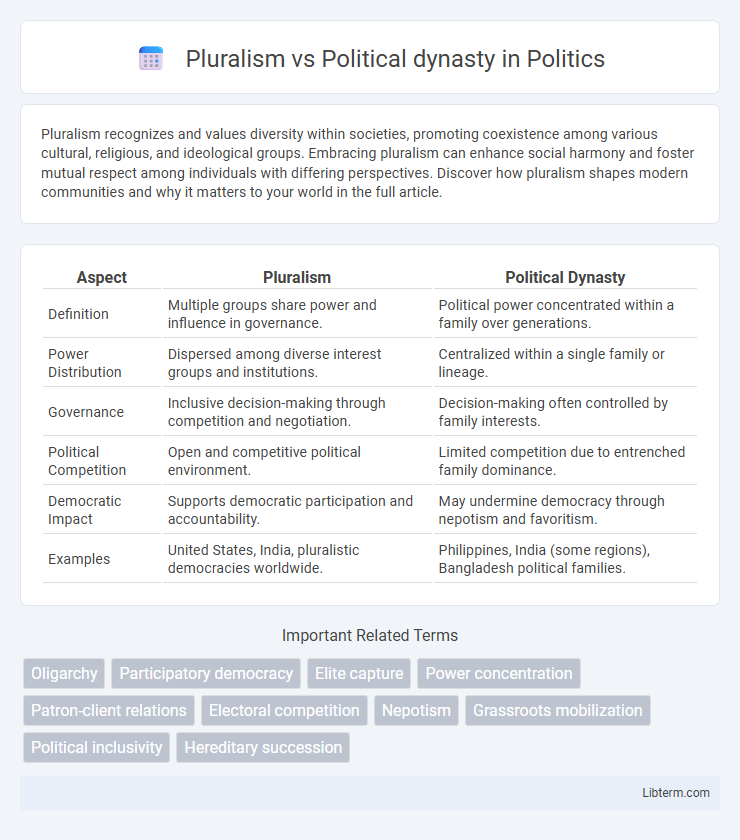Pluralism recognizes and values diversity within societies, promoting coexistence among various cultural, religious, and ideological groups. Embracing pluralism can enhance social harmony and foster mutual respect among individuals with differing perspectives. Discover how pluralism shapes modern communities and why it matters to your world in the full article.
Table of Comparison
| Aspect | Pluralism | Political Dynasty |
|---|---|---|
| Definition | Multiple groups share power and influence in governance. | Political power concentrated within a family over generations. |
| Power Distribution | Dispersed among diverse interest groups and institutions. | Centralized within a single family or lineage. |
| Governance | Inclusive decision-making through competition and negotiation. | Decision-making often controlled by family interests. |
| Political Competition | Open and competitive political environment. | Limited competition due to entrenched family dominance. |
| Democratic Impact | Supports democratic participation and accountability. | May undermine democracy through nepotism and favoritism. |
| Examples | United States, India, pluralistic democracies worldwide. | Philippines, India (some regions), Bangladesh political families. |
Understanding Pluralism: Definition and Principles
Pluralism refers to a political system where multiple groups, interests, or parties coexist and compete, ensuring no single entity dominates governance. It emphasizes diversity, tolerance, and the inclusion of various voices in decision-making processes to maintain balance and democratic fairness. Political pluralism counters the concentration of power seen in political dynasties, promoting broader representation and preventing monopolistic control.
Political Dynasty: Meaning and Historical Context
Political dynasty refers to the concentration of political power within a single family, often passing leadership roles across generations. Historically, political dynasties have shaped governance structures, influencing policy continuity and power dynamics in countries like the Philippines, India, and the United States. These dynasties affect democratic processes by limiting political competition and perpetuating elite dominance.
Key Differences Between Pluralism and Political Dynasty
Pluralism promotes diverse participation and competition among multiple political groups, ensuring power is distributed across various interests and preventing dominance by a single entity. Political dynasties concentrate power within specific families, limiting competition and often perpetuating control through inherited influence or established networks. While pluralism fosters democratic engagement and accountability, political dynasties can undermine these principles by restricting political diversity and entrenching oligarchic rule.
Impact of Pluralism on Democratic Governance
Pluralism enhances democratic governance by promoting diverse representation and preventing the concentration of power typical of political dynasties. It encourages competitive elections and diverse interest groups, fostering accountability and responsiveness within government institutions. The presence of pluralistic structures reduces the risk of corruption and nepotism, thereby strengthening democratic legitimacy and citizen participation.
Influence of Political Dynasties on Political Power
Political dynasties consolidate influence by perpetuating family control over key political positions, limiting competition and diversifying representation. Their dominance often skews policy decisions to favor entrenched interests rather than broad societal needs, undermining the principles of pluralism. This concentration of power restricts the entry of new political actors, weakening democratic institutions and reducing political pluralism.
Societal Implications of Pluralism vs Political Dynasty
Pluralism promotes diverse representation and equitable participation in governance, strengthening democratic institutions and fostering social cohesion. In contrast, political dynasties often concentrate power within limited families, undermining meritocracy and perpetuating inequality. Societal implications include diminished public trust, restricted political competition, and potential erosion of democratic accountability.
Case Studies: Countries Embracing Pluralism
Countries embracing pluralism such as India, South Africa, and Indonesia exemplify political landscapes where multiple political parties and diverse representation counteract the dominance of political dynasties. In India, the multiplicity of regional parties alongside national parties prevents the monopolization of power by a single family, fostering democratic competition. South Africa's proportional representation system ensures diverse voices in parliament, reducing the impact of entrenched political families and encouraging broader societal participation.
Case Studies: Nations Dominated by Political Dynasties
Nations such as the Philippines, India, and Mexico showcase extensive political dynasties, where familial ties heavily influence electoral success and governance continuity. These dynastic structures often limit political pluralism by concentrating power within specific families, reducing opportunities for new candidates and marginalized groups to participate effectively in democratic processes. Case studies reveal that entrenched political dynasties correlate with weaker institutional checks, increased patronage networks, and policy outcomes favoring elite interests over broader societal needs.
Challenges and Criticisms of Both Systems
Pluralism faces challenges such as unequal access to power and resources, often allowing dominant groups to influence policy disproportionately, leading to fragmented decision-making and inefficiency. Political dynasties are criticized for perpetuating nepotism, limiting political competition, and undermining democratic representation by concentrating power within families. Both systems struggle with issues of accountability and transparency, contributing to corruption and weakening public trust in governance.
The Path Forward: Promoting Fair Representation in Politics
Encouraging fair representation in politics requires dismantling the stronghold of political dynasties by implementing term limits and campaign finance reforms that level the playing field for diverse candidates. Strengthening electoral systems through proportional representation and fostering grassroots political participation can promote pluralism and ensure a wider array of voices are heard. Civic education and independent media play crucial roles in empowering voters to make informed choices and hold leaders accountable.
Pluralism Infographic

 libterm.com
libterm.com